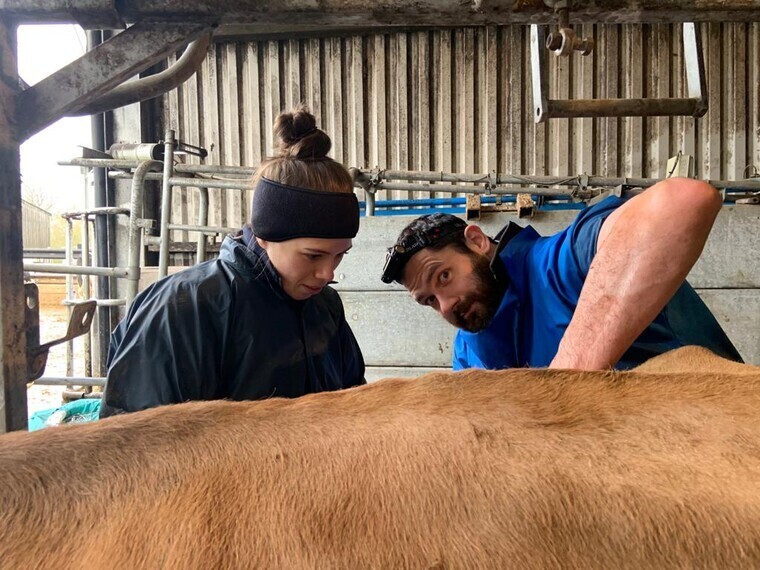It’s fair to say that South East England isn’t the garden of Eden when it comes to livestock farming. The weather, the rapidly reducing amount of land available for agriculture and increasing population density all create a challenging environment.
The provision of farm services has not always been as plentiful as in other rural areas either. From agricultural merchants and machinery dealers to relief labour and veterinary services, it has always felt a bit less well served, according to the group behind new arrivals Green Counties vets.
Just over four years ago, they decided to introduce some healthy competition into the commercial livestock veterinary sector in the South East.
Initially working with a small group of dairy farmers around Edenbridge and Sevenoaks, Green Counties has established a solid reputation for quality service and approachable vets serving dairy, beef and sheep farmers in Kent, Sussex and Surrey.
Since Oli Maxwell moved from a well-established job in Derbyshire to work in what was an unknown area of the country to him, Green Counties has gone from strength to strength. The practice now has three vets working with an increasing base of progressive and motivated clients.
Alongside his 14 years’ experience, Green Counties Clinical Director Oli is a Royal College Recognised Specialist. This enables him to bring a huge range of added value to any enterprise. Colleague Ed Hayes is an Advanced Practitioner particularly focused on bovine reproduction with extensive experience in block calving systems.
The practice has recently welcomed Charlie Hockings to complement the team as it grows. As well as a total of 37 years’ experience, the three vets provide a comprehensive and farmer focused service.
Services include adding value to fertility visits, bull and heifer fertility, lameness reduction and management, and calf health.
Last year the practice became a member of XLVets, a nationwide collaboration of independently owned vet practices. Its aim is to share knowledge, offer support and advice and tender for large scale projects together to enhance the services available to farmers.
This has also increased the variety of services offered to include such things as AI, foot trimming and mastering medicines courses. It has also been possible to organise campaigns in areas of interest to clients such as checking fluke levels in sheep, monitoring fertility performance in suckler herds and mastitis control in dairy herds.
It hasn’t all been plain sailing; 2019 saw a large number of dairies exit production in Kent, including a couple of estate dairies, while one dairy processor’s approach at the start of the Covid-19 pandemic caused some sleepless nights. Despite this, progress has been steady and almost all new clients have been generated from word-of-mouth and client referrals.
The practice began working with industry partners in 2019/20 to put on some farmer meetings and training days but this was halted by the lockdowns, and by the time the regulations lifted the practice was so busy that a third vet was needed. Now that Charlie is on board and things are a bit calmer, the team is looking forward to organising more of these meetings and, as a member of XLVets, contributing to the FarmSkills network of training courses.
FarmSkills is a central database of all the farmer training courses that XLVet member practices provide. Any farmer can find a course he or she needs, even if it isn’t being provided by their own vet practice. From AI courses to mastering medicines and from foot trimming to calf rearing, there is something for everyone.
Green Counties vets are fortunate to work with a range of clients, including high input dairy farms, a number of block calving dairies and, increasingly, a range of beef and sheep farmers, including finisher units, suckler units and calf rearers.
They have also worked hard to form professional links and cooperative relationships with other organisations, from other practices to livestock service providers, pharmaceutical companies and universities. The practice is situated in Felbridge, near East Grinstead in Surrey, but makes use of several independent small animal practices as convenient medicine collection centres for farmers.
The team also collaborates with other independently owned farm practices in the South East to share resources, increase expertise and skills and improve services to clients.
The UK veterinary industry has changed markedly in the past 30 years, moving away from an era when all veterinary businesses were partnerships with the majority fully mixed (companion animals, equine and farm). In the South East this change has been extreme.
There has been a steady closure of traditional mixed vets, leading to the development of farm-only practices and latterly a consolidation of vet groups owned by corporate businesses across most of the region. This has left barely any mixed vets and only a few independently owned practices.
In 25 years, corporate vet practices have consolidated into six groups which own around 75% of all UK vet practices (around 4,000 of the 5,300 in the UK). Three are owned by private equity businesses.
In many regions of the UK, farmers have demonstrated a preference for continuing a relationship with their own trusted vet by supporting new veterinary-led start-up businesses. Green Counties believes the relationship between farmer and vet is as strong as ever and points to surveys that suggest the vet remains the most trusted provider of advice.
Based near the meeting point of Kent, Surrey and West Sussex on the same site as Lingfield Equine Vets, Green Counties follows the traditional practice model of its vets having a vested interest in the success of the business and, by extension, the success of their clients’ businesses.
The future for UK agriculture is always uncertain, with different challenges every year, but as long as there are farms to serve, Green Counties vets will be proud to assist them.




